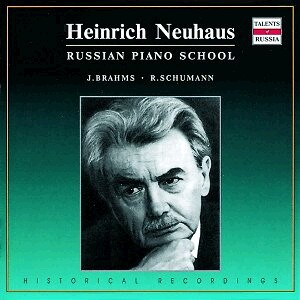|
|
World music CD DVD shop and Classic distribution
|
|
|
|
| BRAHMS, Johannes (1833-1897) | | | 1. | Capriccio in F sharp minor, Op. 76 No. 1 | 2:38 | | | 2. | Intermezzo in A flat major, Op. 76 No. 3 | 2:02 | | | 3. | Intermezzo in B flat major, Op. 76 No. 4 | 2:28 | | | 4. | Capriccio in C sharp minor, Op. 76 No. 5 | 2:57 | | | 5. | Intermezzo in A major, Op. 76 No. 6 | 3:10 | | | 6. | Intermezzo in A minor, Op. 76 No. 7 | 2:50 | | | 7. | Capriccio in C major, Op. 76 No. 8 | 2:50 | | | 8. | Intermezzo in B minor, Op. 119 No. 1 | 2:51 | | | 9. | Intermezzo in E minor, Op. 119 No. 2 | 5:23 | | | SCHUMANN, Robert (1810-1856) | | | 10. | "Kreisleriana", Op. 16 | 30:23 | | Russian labels have devoted themselves of late to Neuhaus’s Scriabin and Chopin - see reviews (1, 2) - whilst Russian Compact Disc itself has pursued his Beethoven sonata recordings (see review). Now the same company turns to a well chosen selection that fuses a fairly obvious Brahms and Schumann conjunction. The Brahms focus is on the Op.76 set though it’s not complete and two of the Op.119 Intermezzi. For Schumann we have Kreisleriana.
Neuhaus’s Schumann is invariably special, the pianist managing to bring expressive tangents to bear at every point. Though this performance is not separately tracked that small imperfection will hardly hinder one’s admiration of a performance so alive, so fresh and vital. II is pliant and gracious whilst IV flows with effortless cantabile. He vests V with tremendous lightness and with rhythmic tightness too. Throughout he ensures that the narrative spine of the music is inevitably maintained but the means at his disposal are so multiform, so full of artistry, that the fluidity and flexibility of individual movements within the grand schema are held in perfect balance. He is poetic and expressive when need be, and a source of tremendous insight and understanding throughout.
A strong sense of characterisation also informs the Brahms selection. The A flat major Intermezzo is weighted and coloured with surety whilst the C sharp minor Capriccio is powerfully etched. Refined legato courses through the A major Intermezzo but perhaps even better is the inevitable sense of drama he brings to the Capriccio in C sharp minor where we find the most telling and subtle of rubati and a stirring sense of theatrical heightening ensured by terraced dynamics and a perfect sense of the architectural peak of a phrase. By contrast - if such should be needed - we have the sense of rarefied simplicity evoked in the B minor Intermezzo, a quality that Neuhaus so eloquently displays in many of his surviving recordings. No wonder he was so admired and held, indeed, in such mystic awe by so many of his fellow Russian performers.
The transfers are perfectly serviceable though they haven’t managed to deal with the more intractable questions of Russian recordings of the period. Those questions are however subservient to the question of artistry; that’s what this disc gives us time and again.
Jonathan Woolf
www.musicweb-international.com
|
|


